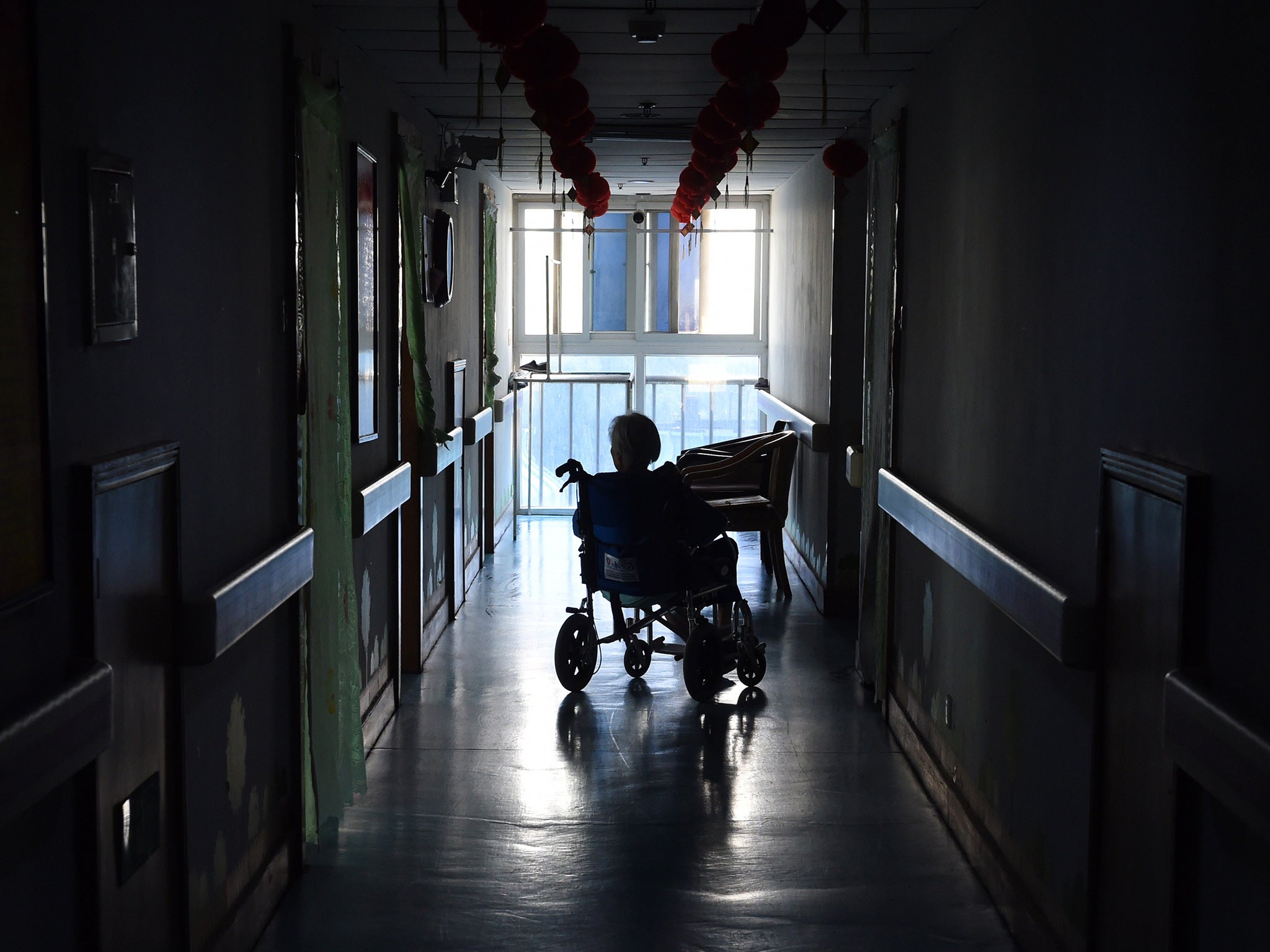Elderly and disabled people driven to self-harm amid ‘drastic decline’ in social care funding under Tories
Social workers expose 'devastating' impact on vulnerable people who have care hours reduced

Your support helps us to tell the story
From reproductive rights to climate change to Big Tech, The Independent is on the ground when the story is developing. Whether it's investigating the financials of Elon Musk's pro-Trump PAC or producing our latest documentary, 'The A Word', which shines a light on the American women fighting for reproductive rights, we know how important it is to parse out the facts from the messaging.
At such a critical moment in US history, we need reporters on the ground. Your donation allows us to keep sending journalists to speak to both sides of the story.
The Independent is trusted by Americans across the entire political spectrum. And unlike many other quality news outlets, we choose not to lock Americans out of our reporting and analysis with paywalls. We believe quality journalism should be available to everyone, paid for by those who can afford it.
Your support makes all the difference.Elderly and disabled people are being driven to self-inflicted harm due to reductions in the care they receive caused by cuts to the social care sector, research has found.
A survey reveals that social workers are having to “constantly battle” to provide adequate levels of support to vulnerable people in the community.
Eye-opening accounts from social workers expose that in some cases, elderly and disabled people who have their care hours reduced are driven to commit acts of self-harm or become prone to physically harming themselves by failing to take medication and fulfil their own dietary needs.
Nearly seven in 10 (69 per cent) social workers feel expected to reduce care packages because of cost pressures in their local authority, according to the research, which surveyed 469 social workers from across England.
More than one in three (37 per cent) felt they were unable to provide people with the care they needed, while 28 per cent were not confident that the reduced care they had to administer was “fair and safe”.
Eighty-three per cent of respondents did not think there was enough variety and quality of social care provision in their area for people to exercise genuine choice and control over the care they received.
The study by Community Care Magazine, supported by the Care and Support Alliance, drew stark comments from social workers describing pressures they are under to reduce care, such as: “I cannot get new packages of care agreed or increases agreed when needs have increased,” and: “[There is] strong pressure from my line manager and commissioners to reduce costs as a main priority.”
They also disclosed how the situation was harming those they were supposed to care for, including instances where old or disabled people harmed themselves and thus required emergency services to intervene.
One social worker said they had worked with a person with hoarding issues and a tendency to eat rotten food who had their shopping and housework care cut, which resulted in an admission to hospital with food poisoning.
Another said that when a service user she worked with was told her care package was being reduced, she seriously self-harmed and had to be detained in hospital.
In another case, a social worker said they had to reduce the care package for three brothers who lived together, each of whom had either a mental health problem, physical or learning disability. When their care package was reduced, two of them went into residential care and died, while the other was admitted to hospital with dehydration and hypothermia.
Some social workers reported that lunch calls and toileting calls were being reduced from 30 minutes to 15 minutes to save costs, while others said their service had removed lunch calls for service users with dementia.
Local councils have repeatedly warned that the social care sector faces an annual 2.3bn funding gap by 2020, and urged that while councils are doing what they can to provide suitable care, steep cuts have put services “at tipping point”.
Responding to the Community Care findings, Cllr Izzi Seccombe, chairman of the Local Government Association’s Community Wellbeing Board, said: “Councils are doing all they can to provide quality and safe social care but these services are now at a tipping point.
“We urgently need a long term sustainable solution in social care, and it is vital government addresses this through its forthcoming consultation.”
She added that the findings revealed the “devastating” consequences of a “broken and under-funded” care system, and urged that they should act as a wake-up call for ministers to tackle the “crisis”.
“The findings of this survey are deeply concerning and lay bare the devastating consequences of a social care system that is broken and under-funded,” she said.
“This should be a wake-up call for government not to delay any longer in setting out how it proposes to tackle the crisis in how we care for older and disabled people.
“Social workers do an amazing job day in day out, in often very difficult and challenging circumstances. They are on the frontline of the social care crisis and sadly witness first-hand the human costs of this, as the survey shows.”
Caroline Abrahams, charity director at Age UK and co-chair of the Care and Support Alliance, said social workers were “blowing the whistle” on the “drastic” state of social care, and urged that the situation would only worsen if action isn't taken.
“This is the first time that England’s social workers have spoken out in such numbers, blowing the whistle on just what a drastic state of decline social care is now in,” she said.
“The social workers’ descriptions of what the cuts mean in practice for disabled people, those with mental health problems and older people make for tough reading and it is impossible not to be angered and saddened by them.
“It is though important to remember that while social care is a service administered by local authorities, ‘the buck stops with Ministers’ and the suffering that vulnerable people are experiencing today is the direct result of the decisions successive governments have made to underfund social care.
“The extra £2bn this Government has pledged will certainly help but the funding gap is far larger, so the situation is certain to worsen without further action.”
Mark Lever, chief executive of the National Autistic Society and co-chair of the Care and Support Alliance, said political discussion around social care had gone “ominously quiet” and said the Government must urgently tackle the issue.
“Social care became an important topic during the recent General Election campaign and in the Queen’s Speech, when the Government committed to consulting on proposals to place social care on a sustainable financial footing for the future. Since then, however, it has all gone ominously quiet.
“This survey of social workers demonstrates why it is so crucial that this Government tackles the social care crisis as an urgent priority. Some of the suffering described is sickening and I think decent people in this country will be appalled at how little support is now available for people in need.”
In response to the findings, a Department of Health spokesperson said: “We know social workers do incredible work and we want to make sure that everyone, especially older and vulnerable people, receive compassionate care.
“That is why we have enshrined in law in the Care Act that local authorities must assess and meet the needs of people in their area. We have provided an additional £2 billion for social care and have committed to consult on the future of social care to ensure sustainability in the long term.”
'I had my support network taken away. It had helped me cope, but it was not there anymore'
Rachael Looby, who is visually impaired, has dyspraxia and autism, as well as suffering from epilepsy, had her care hours reduced from 17 hours a week to just five in 2015 – a change that saw her mental health deteriorate and led to her having a seizure due to missing doses of medication.
While recovering from this, 30-year-old Ms Looby,who lives in Harrogate, mistook her dog’s medication for her own, which led to her having to go to hospital. The incident knocked her confidence and saw her become depressed and socially isolated.

Speaking to The Independent, she said: “It caused a lot of stress. I had to deal with things I can’t deal with — that’s why I had that support in first place.
“It really took its toll on my epilepsy. I had a lot of seizures because of the stress. I’d have to call ambulances when I had one, because there was no one there. I wasn’t taking the medication properly, I wasn’t eating properly.
“It was really difficult to try deal with everything, because I’d had my support network taken away. They had helped me cope. It was not there anymore. Obviously my guide dog can’t tell me when to take my tablets.
“I felt like I was being told ‘well everyone else can get on with it’. I would like to do this stuff, but I can’t do everything by myself. It causes a lot of stress. I can be okay one minute and then the next I’m not.”
Following the incidents, Ms Looby had her care hours increased again, to 19 hours a week, which she said has enabled her to keep herself safe.
“Now I get help to make sure I eat, I take my medication on time, and to do the things I need to do to keep myself as safe as possible. It’s not perfect, but it’s a lot better and it means that actually I get to still live in the community and have own flat,” she said.
“I want to make sure no one else has to go through the trauma or trying to get core support back, I know it affected my mental health.”
Join our commenting forum
Join thought-provoking conversations, follow other Independent readers and see their replies
Comments